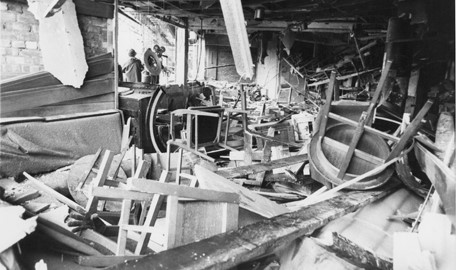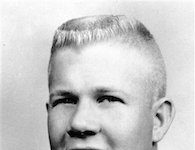On March 14, 1991, six men wrongfully accused of carrying out Irish Republican Army (IRA) bombing attacks on two Birmingham pubs were released after the evidence against them was discredited.
The Case of the Birmingham Six
The Birmingham Six—Paddy Hill, Hugh Callaghan, Richard McIlkenny, Gerry Hunter, Johnny Walker and Billy Power—were accused of committing the November 1974 Birmingham pub bombings, a pair of IRA attacks that killed 21 people.
They were convicted in 1975 based on confessions made by four of them and on a forensics test that showed two of them had handled explosives. They all maintained their innocence, claiming that they had been beaten into giving the confessions.
Journalist Chris Mullin, who became a Member of Parliament (MP) in 1987, took up the case in the mid-1980s, releasing a documentary and publishing a book, “Error of Judgment: The Truth About the Birmingham Bombings,” that claimed the men were innocent. An appeal was rejected in 1988, but the media continued to investigate the story and uncover irregularities.
The British government opened a new inquiry in 1990 to examine the confessions. It uncovered that interview notes with the defendants had been altered by authorities. “At best officers were lying when they said the noting of the interview was contemporaneous,” said Lord Justice Donald Farquharson. “At worst they must have put their heads together to fabricate part or the whole of the interview.”
In November 1990, after years of doubt about the forensics results, government scientists concluded that the original test, which found that two men had handled nitroglycerine, was flawed and would have produced the same result even if the men had handled much weaker substances.
With the confessions and forensics evidence discredited, a Court of Appeal quashed the convictions of the Birmingham Six on March 14, 1991. The freed men released to a “rapturous and emotional reunion with their families outside the Old Bailey and applause from hundreds of well-wishers,” wrote the Guardian.
The men addressed the media and public outside the court. Hill proclaimed, “For 16 1/2 years we have been used as political scapegoats. The police told us from the start we did not do it. They told us they didn’t care who had done it. They told us we were selected and they were going to frame us for it and just to keep the people in there happy.”
“The Birmingham Framework: Six Innocent Men Framed for the Birmingham Bombings,” is a 1976 book by Fr. Denis Faul and Fr. Raymond Murray that argued for the Birmingham Six’s innocence.
Sources in this Story
- The BBC: 1991: Birmingham Six freed after 16 years
- The Independent: Police escape trial by jury
- New Scientist: No forensic evidence against Birmingham Six
- The Guardian: Irishmen freed as appeal is allowed after new evidence
- The BBC: Birmingham was target of IRA attacks
- The BBC: 30 Years On: The Birmingham Bombings
- The New York Times: British TV Names Bombing Suspects
- The Independent: Birmingham Six: 35 years on from injustice
- The Guardian: Birmingham Six member dies in hospital
- The Independent: Birmingham pub bombings: Who are the Birmingham Six? What happened in the IRA attack? Everything you need to know
Background: The Birmingham Pub Bombings
On the night of November 21, 1974, two bombs exploded six minutes apart at the Mulberry Bush and Tavern in the Town pubs in Birmingham, England. One of the perpetrators had called a Birmingham newspaper to warn of bombs at unidentified pubs just six minutes before the first explosion, not enough time to evacuate people.
“It was mayhem because it was like a building site. There were people running, screaming, flooding out. I just remember people walking about with seemingly dreadful injuries and not being aware they were injured. I guess it’s shock,” said Maggie Adams, a police woman who responded to the bombings, in a 2004 interview with the BBC.
The Birmingham Six had been in a train station near the crime scene just before the bombs exploded, as five of them were traveling to Belfast for the funeral of IRA bomber James McDade. The five were being searched before boarding a ship at Heysham when news of the bombings reached authorities.
They were brought in for questioning and transferred to Birmingham authorities the following day. During this time, the men were beaten and forced to sign confessions.
The pub bombings remained unsolved, though it is widely accepted that the IRA was responsible. A 1990 documentary by Granada Television claimed that Seamus McLoughlin, known as Belfast Jimmy, masterminded the bombings.
It fingered four other men who carried it out, including Michael “Mick” Murray, who called in the warning. Murray stood trial alongside the Birmingham Six on the lesser charge of conspiring to cause explosives and was sentenced to 12 years in prison. Two of the Birmingham Six claim that he admitted to them in prison that he was responsible for the attack.
In 2016, the coroner agreed to re-open the inquest into the bombings. Paddy Hill, one of the six, and families of some of the 21 victims campaigned for the new look at the case.
The Birmingham Six After Prison
The six men had difficulty re-adjusting to life in the outside world, with some experiencing relationship problems with their wives and children. In 2009 Johnny Walker told The Independent that he still suffers from physical and mental trauma caused by abusive prison officials: “I’m paying the price now [for] what they done to me.”
Richard McIlkenny died of cancer in 2006 at the age of 73. He had moved to Dublin after being released from prison.
Irish History
Historical Context: The Troubles
The Birmingham pub bombings were a bloody chapter in the Troubles, a period of sectarian violence in and around Northern Ireland stretching from the 1960s to the 1990s.
Northern Ireland was formed in 1921 following the Anglo-Irish War, when six northern counties of Ireland were split off from the newly independent south. The Protestants were able to control the government through gerrymandering and passed discriminatory laws against Catholics.
In the 1960s, the Catholic minority organized both violent and non-violent resistance, sparking civil unrest that continued over the next three decades. Paramilitary groups on both sides became active, most notably the Provisional IRA and the Ulster Volunteer Force. The IRA had set off nearly 50 explosions in the Birmingham region in the 15 months before the pub bombings.
More than 3,500 people were killed during the Troubles through bombings, shootings and other violent attacks. The Troubles drew to a close with the Good Friday Agreement in 1998 and the IRA’s decision in 2005 to cease their campaign to reunite Ireland.
Related Topic: Criminal Cases Review Commission
Following the Birmingham Six incident and other miscarriages of justice around England, Wales and Northern Ireland, the U.K. government established the Criminal Cases Review Commission. The mission of the organization is to determine whether convictions or criminal sentences should be referred to an appeals court.











